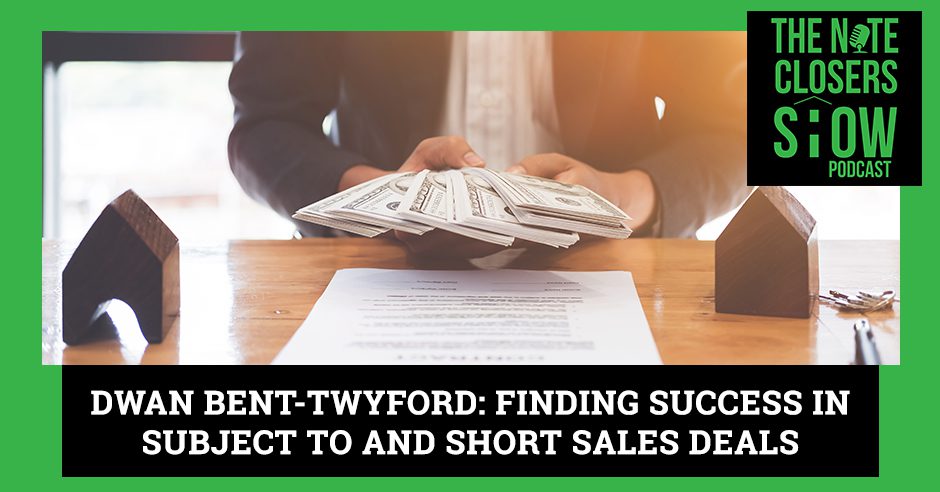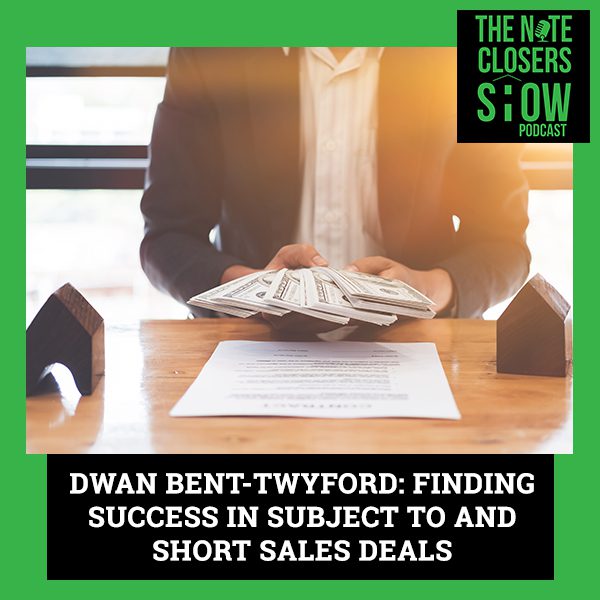
Despite being an industry focused on properties and paperwork, success in real estate favors those with a creative mind and a passionate heart. Having both of these characteristics, Dwan Bent-Twyford made it big in rehabbing and now transitions to subject to and short sales deals. Scott Carson sits down with America’s Most Sought-After Investor and the host of The Most Dwanderful Real Estate Podcast Ever to discuss these kinds of deals (past and present) and why she loves them so much. Dwan also shares about her real estate classes and programs, as well as the inspiring story of what it’s like to rehab an entire downtown in Iowa.
—
Watch the episode here
Listen to the podcast here
Dwan Bent-Twyford: Finding Success In Subject To And Short Sales Deals
We’re busting to the energy here with my special guest. She is somebody who is such an expert at subject-to and short sales. This lady has gone from getting fired at Denny’s to knocking grand slam deals. She even has a rehab in the town. We are so jacked up and honored to have America’s number one short-sale foreclosure expert. She’s known as the Queen of Short Sales, America’s most sought-after real estate investor, the one and only pink-haired diva, Dwan Bent-Twyford, joining us here from Florida.
Thank you, Scott. I hear the introduction. It’s like, “Who was he talking about? That can’t be me.”
You’ve done such an amazing job. Not only you’re a big advocate for helping people out there. You’ve done thousands of deals. How did it all get started? You talk about getting laid off and learning so much. Starting at rock bottom, you have no place to go but up in a lot of cases.

Short Sales Deals: There are so many extensions on with banks that people are taking advantage of.
I am so rock bottom. I turned 21 in 1980. If you weren’t in the ‘80s, you don’t get it but I worked at nightclubs and bars. Everything was cocaine and champagne. It was a decadent time. Everything was so great. I got more serious, got married, had a baby and I’m 30. I’m like, “I want to be like a Suzy Homemaker, the Girl Scout mom, the homeroom mom. Completely different from before.” My husband and I went through an unexpected split-up when my daughter was only eight months old. People always ask me, “What happened?” He got arrested for selling drugs and he was in my car.
The car was gone, the husband was gone, and the income was gone. The bank account was frozen and I had an eight-month-old baby. I was like, “What am I going to do now?” It became clear that he was not getting out. It was clear that I was going to have to make it on my own. Honestly, I didn’t know what to do. I used to work the third shift, 10:00 at night to 6:00 in the morning. Those are the shifts where you can pretty much do anything and I got fired.
Looking back at that, I’m thinking, “Who gets fired from Denny’s in the middle of the night? How bad do you have to be to get fired at 3:45 in the morning? Who is that person?” It’s me. I made the decision. I knew my ex was not going to be part of the picture and I didn’t want to move back home to Ohio. My parents were like, “Come move back to Ohio.” I was like, “I’m already living in Florida.” I made a decision that I was going to have to figure out a way to work for myself, raise my daughter, and put on my big girl pants. I went through all the crap, anger, mad and all the stuff that you go through. I discovered real estate investing.
From meeting people, I met some guys. We buy houses, fix them up and sell them. Honestly, I was so naive. I thought that meant we buy houses and decorate them. I didn’t know the word rehabbing. I didn’t know what that word meant. It’s like, “We buy a house, fix them up and sell them.” I’m like, “I’ll fix them up, decorate, pictures, walls, plans, custom-made blinds and paint. I can do that.” Honest to God, with my first house, I thought I was just going to decorate and fix it up. I didn’t know that that meant kitchens, appliances, plumbing, pressure washing, painting and landscaping. I was so far buried over my head and I don’t know what I was doing.
I started going to Home Depot and took classes. I had to take classes. I don’t know how to lay tiles. I learned to lay tiles. At night when Darby’s sleeping, I’d be putting together cabinets, making the screens with the windows. I made $22,000 on my first house. I was like, “It’s a lot of money. I’ve never had that much money. My daughter’s with me every day and I am selling some stocks. I’m going to keep doing this,” and here I am.
You had no place to go but up. You couldn’t go down. You throw it out there. You weren’t scared to get out, get your hands dirty, roll up your sleeves and go to work.
It’s funny because when I look back at that first deal, I hadn’t truly understood what rehabbing was and the level of rehab in this house. My first person was a hoarder. I did not know what a hoarder was until the TV shows came on. I was like, “That was my first house.” I was like, “That was a hoarder. No wonder her house was so bad.” I feel like if I had taken a bunch of classes, had a bunch of education, and knew all that, I’m not even sure I would have had the guts to do it. That was honestly my biggest asset. I had pink kahunas and I was super naïve. I was like, “The worst case is I can work at the Waffle House. I can go from Denny’s to Waffle House.” That’s it.
You learn a lot about that, especially getting thrown into the fire like that, a hoarder house. It’s the worst of the worst that you can get through. Once you’ve gone through that, you’re like, “I can accomplish anything.” A light rehab or a subject-to deal is pretty easy to deal with once you’ve dealt with that stuff.
I remember being in that house and there were little tiny pads. I’m thinking, “What is this about?” There were hundreds of empty wine bottles, dog food and so much stuff. I remember walking into this house and I can’t even see the wall. I was thinking, I don’t remember what the house look like. It’s going to take a lot of decorating to make this look good. I didn’t know. I’d have to strip it down to the drywall because all that stuff is so thin. Until that show came on, I did not know what a hoarder was. Even to this day, I’ve done three deals like that. I’m like, “What is wrong with these people keeping all this crap?” I didn’t even know it was a thing.

Short Sales Deals: Subject to deals create three wins for an old person, a new person, and yourself. It’s also a win for the bank because they get a defaulted asset off their books.
That’s something you and I have in common. My first ever appointment with a homeowner from a letter campaign ended up going to a hoarder house. It was like that. I threw away the clothes I was wearing because they stunk so bad. They had five dogs doing everything in the house and no food, no water for four months. When you’ve gone through that, as Ron Legrand’s famous quote, “The smell of shit and piss is the smell of money.”
I did another hoarder house a little bit later. I still didn’t know what it was. This was a 640-yard dumpster. I remember thinking like, “Who on the face of the earth can even accumulate that much stuff in a lifetime? How could you even have that much stuff?” Even then, I still didn’t know what a hoarder was. I just thought, “People are crazy.”
What helped you make the transition into doing more short sales or being such a big fan of subject-to deals?
I started off with rehab. When I started, I was here in South Florida. There were no REIA groups yet. If you wanted to find anything, everything was in the classified section of the newspaper. I have people to be my eyes sometimes. These kids are like, “I’ve never held a newspaper.” I was like, “If I have one, I’d smack you over in the head with it. What do you mean you haven’t touched a newspaper?” Everything was in the paper. I’m always looking at the houses for sale. I saw in this ad that there was a brand new real estate investor group that was going to meet over in Boca Raton. I was like, “There will be other people there like me maybe.” I go to this REIA group and it’s the first one in South Florida. There are 80 people there. There’s one other woman and me, and then it’s all guys.
I start meeting and talking to people. I tell them what I’m doing. Throughout the course of several months, I started hearing people talk about wholesaling. I was like, “I don’t know this word.” I can get them under contract and sell them to a rehab or a landlord. I’m still working on houses at this point. I’m like, “This is some nice slice of heaven over here. I can wholesale this house.” I started wholesaling. In my first deal, I wholesaled 75 houses. I was a working machine. I was used to putting in the time and the hours. I thought, “I want to do a ton of them. I need to learn this because this sounds better than fixing houses up.”
My first short sale was by accident. I had this house. On a deal, if you plan to make 5,000, in your mind, it’s already spent. I had this deal. I was going to make $5,000. The final documents came in and there was a bunch of fees at it. I was only going to make $1,000. I was like, “I need the whole $5,000.” I can’t bail out. I can’t let the homeowner lose their house. I’m like, “I don’t want to do this $4,000.” I called the bank up. I said, “I went over these numbers. You’ve got to knock some of these fees off. I can’t close the deal.” The girl didn’t even put me on hold. She was like, “We’ll do that.” She knocked off those fees.
My light bulb goes off and says, “I got $4,000 worth of fees knocked off. I’m doing this until the end of time on every deal.” I did it on the next one. I have five deals under my belt. Still, we weren’t calling anything short sales. It wasn’t a term. It was shorting, buying and discounting. There was not even a term like that. After about 4 or 5 deals, I thought, “I wonder what would happen if I had some take less on the mortgage.” I am very meekly. It was like, “What about this little bit?” I got a few of those. I had this house and they owe $90,000 but it is trash. I thought, “I’m going to offer $30,000 and see what happens.” I offered $30,000 and the bank came back a week and said they would take it. I was like, “I just discovered something.”
There was no one teaching so I’m talking about it. I started calling the bank. I said, “Let’s short sale.” I trademarked it way back. I wrote a book. It’s called supplemental trademark because you can’t trademark the term short sales because that applies in mortgages and a lot of industries. As it applies to real estate investing, I was like, “That’s it. I am the Queen of Short Sales.” We’ve done a join up then since and our students. It’s a whole thing.
It’s amazing how it’s changed compared to when you started with the whole short sale chaos of 2008, 2009, 2010, 2011. How it was the Wild West beforehand, then these banks. I hate to say this but I have to give Bank of America credit a little bit for coming up with their systems that helped lead the industry a little bit. They were difficult to deal with.
The Equator System, I remember all the investors were like, “We had to do it with the bank. We can’t get the same person. We can’t use all the things and buddy up with the people at the bank. It’s going to get terrible.” I said, “No, it’s going to be so efficient. The bank’s putting it in and the information is in there. No more FedExing or faxing. All of that is gone.” How many times did you fax the same package? It’s 100 times. I thought that was great. I was excited about that because it has simplified it. A part of it is you do work with the same bank a few times and then they know you. It wiped that out. If you’re doing a good job and you can back all your numbers, I felt like it made it a lot easier.
I was dealing with a short sale on a property and was financed by EverHome Bank. I got the head of the short sale department on the phone, Rachel Gile. I can remember her name. She sounded like she smoked four packs a day. I’m talking to her. I asked her, “Do you want to come out to an event and talk about short sales?” She was like, “I don’t know if I can do that.” It was funny. It was throwing those little oddball things like, “We’ll accept your counter on that and go from there.” I asked her, “You live in Florida. How are you doing?” She’s like, “You’re doing this professionally. Are you helping people out? All eight of my employees and I need help. Can you help us short sale our own homes too?” That’s how we got in tight with EverHome. Every deal we ever submitted through EverHome got a better price point on it.
I used to tell people, “Do not tell all these banks that you work with me because I’ve worked with all these banks.” I know all the bosses of loss mitigation in a lot of the banks. I don’t need 5,000 people saying, “Dwan taught me,” especially if they’d call. Some of the banks where I met people high up, I was like, “Do not.” “What do you mean you are in a program and you’re teaching people across the country?”
That’s one way to get blacklisted pretty quickly.
It is. I didn’t know. I was like, “I don’t know how much all these people talk with them,” but do not mention my name anywhere.
Are you seeing an influx here of short sales compared to the last couple of years with everything that’s been going on?
There are many extensions with the banks that people are taking advantage of that. Some of them, rightfully so. They are not working their money and are unemployed so I understand that. What’s going to happen is the bank is going to be like, “Let’s start making payments again.” I could be wrong but I feel like a lot of people will put their houses on the market. There will be a whole bunch at one time, which will now take this market. I know people are selling houses like hotcakes. The interest is so low and the houses are getting up. Are they worth that much? In 2008, all those liar loans. You can get involved in the marriage to have a house. “We’ll give you 125% of the value of your house.” When all that came up to, “Let’s make a payment,” it crashed and burned. I feel like we’re on the cusp of another crash and burn situation.
Homes are becoming so unaffordable. The president or chief economist for Redfin said there was a $50,000 average increase across the country in pricing on new home sales out there.
All at one time. That’s not warranted buy anything.
The counter side of that, if there’s not that many short sales are something that you and I are a big passionate about is subject-to deals. Let’s talk about those. Why do you love them so much?
I like stuff that’s creative, first of all. We rehab. We still do a lot of things like that. Personally, the more creative a deal is, the more exciting that is. The thing about the subject-to is you have homeowners that are willing to walk away from their property. They can’t afford it. They want to move and be done with it but they know what it’s worth, the condition or something. You cannot get a short sale. You can’t do anything with it and if you don’t know about the opposite of a subject-to, that person moves off, loses her house, goes into foreclosure, closure on credit, all that stuff happens to them, but you have a perfectly good house right there that you could sell to somebody else who doesn’t mind paying exactly what it’s worth.
They don’t mind paying a little bit more for the interest rate because something happened to them that they can’t go to the bank anymore. You feel like this giant void of people that want homeownership again and people that do just undone, You fill a void in there. There are millions of houses that fall into that spectrum. I don’t feel like a lot of investors know that it’s an option. I do a workshop on them. We’re talking about subject-to. People have this deer in the headlights, “What are you talking about? I don’t know what you’re talking about.”
I’m like, “We’re getting the home deed out to us. I’m selling it over here to this guy and giving him a new mortgage. Paying for that one. Every month that goes by over here, this guy’s credit gets better. This guy is working on his credit. When it’s all said and done, everybody wins.” I liked the fact that you’re helping an old person, a new person and yourself. You’re creating three wins. It’s a win for the bank too because the bank gets a defaulted asset off of their books too. There’s no loss for anybody.

Short Sales Deals: If you’ve owned rental property in college towns, it’s a huge opportunity to pick up some subject to deals since the kids are doing remote learning nowadays.
It is truly a great thing out there because the borrower that’s going through something want to walk away. They don’t want the responsibility. We’ve seen plenty of increases in divorces. That’s a starting point. People are moving. A big thing is if you’ve owned rental property in college towns that the kids aren’t going back to school and they’re doing remote learning. That’s a huge opportunity to pick up some subject-to deals because usually, a lot of out-of-state owners don’t want to deal with that headache.
When we do our workshops, there are always 4 or 5 people in the audience that go, “What homeowner would leave their house and walk away?” I said, “First of all, if you were in that person’s shoes and you lost your income or your spouse, you don’t want it to completely destroy your credit and someone will say, ‘I can help fix a little piece of your credit by making your payments on time for you. I can give you X amount of money to move and start fresh.’” Millions of people will say yes to that. That’s the first thing, “Who would do that?” You got to be on the other side of the fence because a lot of people will do it. It fills a big void that I don’t think most people even know it’s there.
You don’t need a lot of cash. You may need a little bit of cash to catch up on some of the arrearages. If you’ve got a low interest rate, it comes down to what is the payment on it, the ITI versus what market rents are or what you could finance that property in a wrap-around mortgage.
Everyone says, “I’m about to do a sale cost.” Does every single person ask you that? Not the homeowners. These are your audiences. The homeowners are like, “Tell me what to do.” We use land trusts. We have the power of attorney. We have every document in the face of the earth, from the homeowner and also from the person I sell it to, including I get a deed in lieu of foreclosure. In their mortgage, it’s really specific. If you don’t make these many payments, I don’t have to foreclose on you. I’m going to file the deed and we’re going to do Cash for Keys, shake hands and move on.
We have done 300 and maybe 70 subject-to and not one single person has made me take them to the foreclosure process. I’ve had a few calls like, “Dwan, I couldn’t ever make the payments. I could call you.” We’ll give them a $2,000, $3,000 or $4,000 to move and say, “Broom sweep on your way out.” I sell it again. Not a single person has made us go through the foreclosure process because as an investor, I know if they get some badass bankruptcy attorney, they could keep me tied up for a long time. With disclosure, everybody knows what’s happening. I feel like it’s one of the greatest ways to make money.
It’s a great way to make money in that whole deep blue and escrow sitting there. I love using that. If you get more than 90 days behind, I just go ahead. Let’s get you to do Cash for Keys, walk away and make it a win-win for everybody.
We do it for 60 days. We make the first phone call. It’s like, “If you can’t make the payment next month, we’re totally fine. We’ll give you some money, move out and then that’s it.” I feel lucky that we’ve done that many, and not a single solitary person is avoiding. People will hide behind the phone. You can’t reach them. Be honest and transparent with people. There’s no shame in falling behind again. If something happens, please let me know. Don’t make me come after you because the other side of Dwan is not so nice.
She’s not so Dwanderful at that point.
I’m not Dwanderful. My dad used to always say, “The thing about Dwan is she’s the nicest person in the world but if you cross her, she’s got ice running through her veins.” I was like, “Dad.” He’s like, “I’m only telling the truth.” I’m like, “It could be.”
Let’s talk about the flip side of this. Is there something that you like on the underlying mortgage that you’re taking over subject-to? What are some characteristics that you like? Is that the equity and low-interest rate? I know there’s a little bit.
Personally, I always want to have a fixed interest rate. You don’t know when that’s going to happen. Once I give my new person a mortgage, I want their interest rate fixed and solid, this is what the deal is. I look for anything that’s a fit. The lower the interest rate, the better. Even if this person has a 4% or 5% interest rate, this person that cannot buy a house any other way, if they have to pay 7%, they will. Ideally, this house over here has a little bit of history on it so that when I get out my new mortgage, this one doesn’t come due before this one. What we do is we call it three things. We call the front load profit. That is the money that this person gives me and I give them a mortgage.
For those that are reading, that would be the person that is looking for a house. They’re looking to buy a house that Dwan is owner financing them through the subject-to deal. They’re giving you the down payment. What kind of down payment are you looking for, Dwan?
We do houses about $200,000. That’s our range of where we’re at. I try to find people with $15,000 and $20,000 down. People are always like, “Who has that?” There is a shocking amount of people that have that much money down. Maybe a couple of generations living together and are all pulling money. I’ve never had anybody that couldn’t come up with $15,000 down ever. People are like, “They could buy a house.” They can’t. They have something that happened in their credit and they can’t buy a house but they want to.
My ideal deal is I would get $20,000 down and even if I have to make $10,000 in back payments to the person losing the house, I still have $10,000 in my pocket. We have what we call the front load profit. It’s the difference between my homeowner in distress, whatever their mortgage payments might be behind and the deposit that my new person has given me.
We have the deferred profit. It is the difference in the money every single month. It might be $300, $400 or $500 per month. We have what we call the backend profit. The backend profit is a difference from my original mortgage to the one I gave my new person. We have three separate paydays. If you summarize and look back at the deals, I feel like the average deal got about $50,000 in it. It’s easy to get $10,000 to $20,000 upfront. If you’re making $300 or $400 a month for 5 or 6 years, that’s another $20,000. When you cash out, it’s another $10,000, $15,000, $20,000 there. It’s easy to make $50,000 or $60,000 on what appears to be a no-equity deal. I have a program called No Equity Equals Big Profit. They’re like, “What does that mean?” I was like, “With all these no equity deals, the average investor passes because they don’t know that there’s $50,000 sitting there and two people that both need help.”
Being a deal artist can hit it out of the park because you’re putting somebody who’s got a need to walk away, get that financial burden off their plate, divorce, debt, job loss, moving, whatever it might be. You’re dealing and serving a need to somebody out there like business owners, doctors and a lot of professionals that make high good money but they can’t afford it because they are paying their own bills and it doesn’t happen one time.
I’ve done a lot of these, especially in Colorado because the Army and Naval bases are out there. We’ve had a lot of people that have called like, “I’ve never missed the payments. I have to move in two weeks.” They will give us their house in perfect shape. It’s not even behind 30 days. “I don’t want my credit to be destroyed.” We get these houses that are beautiful. I am very strict on making sure this person over here signs everything, including adopting their firstborn son over to me. I make sure that this person over here has no wiggle room, whatsoever. If they default, it is fine. I’m happy to do that but no one’s going to drag me through the wringer. That’s not happening. I’m happy to help everybody.
On the average time, are you’re doing it for a 30-year wrap or a 5, 7-year?
We price them out for 30 years. We used to have a five-year balloon but the whole Dodd-Frank is screwing them. Up until then, I had an absolute five-year balloon. If you needed to extend it, we had to read your documents. You had to pay extra points again and we’ll start again. I tell the homeowner that is signing the house to me, “We’re going to try to have your name off the mortgage in those 5 to 7 years,” but I try not to go past seven.
At some point, even if they hate it now, they’re going to want to buy another house. They might say, “I’m never going to buy that house again.” We knew that if the anger settles, they do. I’m like, “If you can’t get your credit score away in the next 5, 6, 7 years, then you’ve got something going on over there too.” I don’t have the exact date that you have to pay it off because I can’t force that, but everyone understands that at the five-year mark, you must be qualified and refinance this house out. If it goes past that, then we’re going to restructure what we have going on.

Short Sales Deals: The lower the interest rate, the better. But even if this person has a 4% or 5% interest rate, they cannot buy a house any other way. If they have to pay 7%, they will.
You keep them at an interest rate. People can go out and get a low-interest rate. Don’t give them something they can’t go get. 6%, 7%, that’s the carrot dangling in front of them to work on their credit score to make payments on time. They make two years of payments to you and you can show that that’s a pretty easy thing for them to go get refinanced out.
A lot of investors don’t know. We can put all those good payments on their credit report. I can say, “You make 24 payments to me. I’m going to put all that on your credit and I go to the roof over here. Every month pass all those payments you miss helps restore. We’re restoring and getting paid in the minute.”
When you know how to structure them and you got everybody to sign off on everything, it is a beautiful way to make lemons into sweet-tasting lemonade out there.
For anyone reading that’s new, I don’t know if they’ve read it already but they’ve heard me say this too, I feel like the most daunting thing for a new investor with subject-to is people are afraid of the paperwork. You got to paper both sides up. That might keep a lot of people from trying, “It was a lot of paperwork. I don’t understand what all these things are.” If you follow somebody like you or me that does it who’s like, “Here are your papers,” and you do everything right, it is one of the easiest things because you don’t need money, credit or a real estate license. You just need someone like you or me to say, “Here’s how you do it.” Off you go and you’re not a landlord.
You’re putting yourself as the bank. The new owner of the house is responsible for repairs and taxes. That’s the same thing.
Nobody calls the bank and says, “My grandkids came over and stuffed their stuffed animals on the toilet. Can you unplug it?” They don’t call the bank for that. I’m such a huge fan of subject-to. I love talking about them and exposing people to them. There’s so much money there.
You’ve been teaching this for a while. You’ve got classes and workshops on this too.
We have programs. We do webinars. I love doing live workshops because I like meeting my students and working with people. I miss that. We have programs and the whole thing like that because I am a big fan of them. My husband and I are big fans of doing it. It is a nice way for people to get monthly income without having to be a landlord. It’s like with your note buying. People get those notes structured out. You can build a gigantic million of dollars a year cashflow and never own anything. People are buying them out.
It’s not based on credit. You don’t do the financing. You’re using your end buyer to be the money guy. It’s a total win-win went across. That’s why I so love them so much, especially with such a low record of interest rates in the last couple of years. People in distress out there, it’s a great strategy.
People are like, “I don’t want to be a landlord.” I’m like, “I don’t either.” I get it. I’ve had those phone calls and I was like, “What?”
Dwan, you got a podcast out there. It’s rock and rolling, and doing some amazing stuff. What is the best way for our audience out in note nation to follow up with you, listen in or connect with you?
They can go to my website, which is Dwanderful.com. My podcast is called The Most Dwanderful Real Estate Podcast Ever! If I can’t have fun with my name in my show and all my stuff, what’s the point? For anyone that would opt-out on my site, I have four free eBooks. They’re small eBooks. One is on a wholesaling short sales and a little bit of spreads. Giving people like, “Here are a few things you can dip your toe in and see what you like.”
You guys are also doing a major rehab job in a town in Iowa. Let’s talk about that. I love that story. Let’s hear about this.
You’re going to love how this started. My husband is from this town called Clinton, Iowa. It’s a little town by the river. It was one of those downtowns. It’s only 3 blocks wide and 3 blocks feet. It’s a little town where time stops. Everything had been down there forever. There’s no activity. We’re going back to all these reunions. The long and short, we start being like, “This town needs a little love. Maybe we could buy a couple of buildings.” We contact someone from the city and find out that it’s an opportunity zone. They’re doing a city beautification to rejuvenate the downtown. It needs some investors to come in and buy up all these buildings. Some of them have been sitting there for a decade just board it up like a ghost town. Sometimes it’s who you know and God stroke of luck.
We have a family friend and his name is Dwayne. Sadly, he passed away a few years ago. He was 94. My husband’s from there. He knew my husband’s dad. We bought this one building. He says, “I know this lady over there who owns that building.” It’s a three-story. This building is one entire block. Her husband passed away. She didn’t want the building anymore. “I could hook you up on a phone call and see what happens.” We call her up and we start talking to her. She doesn’t want to take care of the building anymore. She’s 80 years old. She says, “There’s another lady in town. We want to move to Florida.” We talked to her and we gave her to structure a 100% owner financing deal. She doesn’t care about the money. She just wants the payments because she wants to move to Florida.
We get this house. It’s a massive building and needs a lot of work. A couple of months go by, I get a phone call from one of her friends. She goes, “I haven’t made payments over here on time. I’ve got three buildings. My husband passed away. I’m willing to give you the same deal but you got to take all three.” I was like, “No money down, no carry-on note. I’ll mail you the check to Florida. We’ll take those three.” Another lady called. She’s like, “I have two.” They’re all friends. They’re all in their 80s. All of them have outlived their husbands and none of them wants their buildings. We ended up getting the 1, 3 more and then 2 from these women talking. They’re like, “We’re all moving to Florida together. Don’t miss a payment. Don’t ever make us come back to Clinton, Iowa.”
They all financed everything. You can’t even say no. The bank called said, “We’ve got two buildings that we’ve owned for years. No one’s ever bought them. We’ll sell them to you.” “No. We don’t want to buy them from the bank.” They’re like, “We’ll finance them for you. We’ll create a mortgage if you make us a payment.” They structured those. I’m like, “We have to stop buying buildings.” We now have ten. We’re only going to buy one. Another guy down the street was retiring. We went and talked to him. He was like, “I’m walking away. I’m ready to go. I’m ready to retire.” We’re like, “You want to get rid of the buildings?” He’s like, “You can have my building.”
I swear to God, it keeps falling in our lap. We’re like, “We have to stop buying buildings.” We now have fifteen and we’re putting it in businesses and a few of them. We have a lot of commercials. The great thing is a lot of the spaces have commercials. During COVID, nobody had to shut down. Everybody kept making their payments. What we did is we had a hairdresser and a few things. They were able to stay open in Iowa but they have been in that building for a decade. We gave everyone three months. We said, “We’re going to give you three months because we’re happy you’re in the space always sending money. Take that and start making payments in a couple of months.”
Everybody stayed open and was so grateful. I’m not going to evict someone that’s been there for ten years because of COVID but I also don’t want to sit there with a building with nobody making payments. We gave everybody all kinds of breaks and did all kinds of things that we didn’t need to do but was the right thing to do. Everything kept rocking. We opened three businesses during the pandemic.
Are all of them occupied? Are you rehabbing some of them?
At this point, we’ve got two that are still not occupied. We’re finishing up one. It will be open soon. It’s an indoor farmer’s market. I’ve already gotten 100 vendors lined up for space. In all of our buildings, every one of the spaces is full because a lot of people heard that we were so good and they left their building and came to our building. We don’t have a single vacant space and we have a waiting list during a pandemic. People were like, “We heard you gave them three months. You did this and that. Our landlord didn’t do anything for us.”
A lot of people were out of their leases and moved into our buildings. The goodness came back. I’m telling you, when that second one call, she said she had three years, I was like, “It’s going to put us at six buildings and then there’s one more. That’s eight. Where’s the line?” The good thing is because we bought, some other out-of-state investors saw activity, 7 or 8 buildings had been purchased by other companies that wouldn’t come in until we came in.
The town is like Buckley. There’s a thing going on. There will be 2,000 people downtown because they have a wine walk. Every single store gives out free samples of wine. I was like, “The whole town had been drunk.” I’m going to have a wine walk, I’m telling you, it’s worth the drive over to the town so go there because every business gives out food, wine samples to get you downtown. It is the biggest party I’ve ever seen.

Short Sales Deals: Everyone understands that at the five-year mark, they must qualify and refinance their house out. If it goes past that, the entire process must be restructured.
Kudos to you. Keep up the good work. I’m sure the value of this property has skyrocketed since you got cashflow, NOI and cap rates are going through the roof there for you, which is awesome.
We were going to sell a couple of them. I’m like, “I don’t want to sell them. I want to keep them and pass down that generational wealth to our kids and grandkids.” Even with my other grandkids, we bought something for their birthday. Each one of them got a gumball candy machine and we put them in the buildings. When they go to Iowa, they’re like, “I’m going to go check on my investments.” My granddaughter had a key. She opens the machine and takes all of her quarters out. She goes and buys candy or whatever. She puts it in and puts the rest in the bag. She’s like, “I got a bag of money.”
Dwan, this has been awesome. It’s been such a good time with you. I look forward to hanging out with you some more. She’s going to be one of our guest speakers at our upcoming Note Camp Convention. We’re looking forward to you coming off and teaching more.
Thank you, Scott.
I’m honored to have you. Make sure you give Bill a high-five for me and say hi as well. Go take some action. Check her out, her podcast and her website. She’s got four of those giveaways for you to learn some stuff. She’s been the most Dwanderful guest, as we know. She has a lot of energy. Check out The Most Dwanderful Real Estate Podcast Ever. We’ll see you guys all at the top. Be safe.
Important Links:
- Dwan Bent-Twyford
- No Equity Equals Big Profit
- The Most Dwanderful Real Estate Podcast Ever!
- Note Camp Convention
- http://1234Closures.com/join
About Dwan Bent-Twyford
 Dwan is known as the “Queen of Short Sales”® and is considered to be the Nation’s #1 Expert on Short Sales & Foreclosures. She has written two best sellers, “Short Sale Pre-Foreclosure Investing” & “How to Sell a House When It’s Worth Less Than the Mortgage”. She is highly sought after and has been featured on Fox and Friends, MSNBC, Naomi’s Good Morning, Colorado and Company, and many other TV, radio, and print media. She is also the host of the podcast, The Most Dwanderful Real Estate Podcast Ever!
Dwan is known as the “Queen of Short Sales”® and is considered to be the Nation’s #1 Expert on Short Sales & Foreclosures. She has written two best sellers, “Short Sale Pre-Foreclosure Investing” & “How to Sell a House When It’s Worth Less Than the Mortgage”. She is highly sought after and has been featured on Fox and Friends, MSNBC, Naomi’s Good Morning, Colorado and Company, and many other TV, radio, and print media. She is also the host of the podcast, The Most Dwanderful Real Estate Podcast Ever!
In addition to being the Nation’s #1 real estate investing expert, she is a Christian, mother, wife, financial counselor for her church, and a corporate sponsor of Orrin Hudson’s “Be Someone” nonprofit organization – a program designed to keep kids off the streets by teaching them to play chess.
Her goal never changes – to make a difference in the lives of others!
Love the show? Subscribe, rate, review, and share!
Join the Note Closers Show community today:

